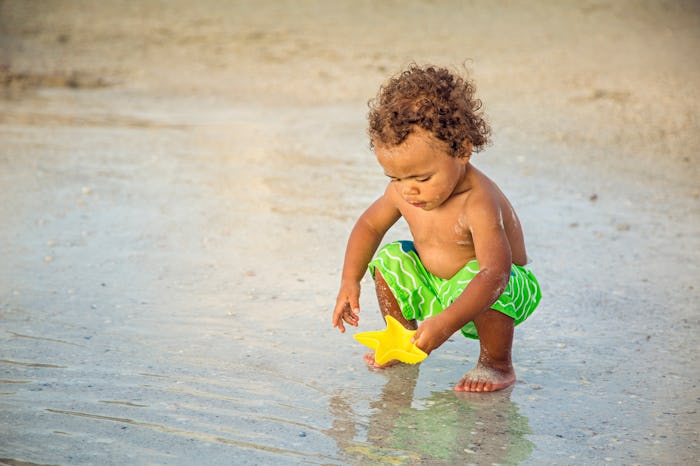It’s safe to say this summer is unusual: there are no trips to crowded pools, no packed neighborhood barbeques, maybe not even that special vacation your family was looking forward to all year. If you're getting desperate for a change of scenery, a trip to the beach might be doable — but even a quick visit to the shore comes with all new safety questions. Can coronavirus live on sand, for example? Unlike most surfaces, it's not like you can wipe down a spot on the sand with sanitizer.
"It’s very unlikely that [the virus] will survive on sand especially if we’re talking about sand that’s been exposed to sun. The UV light will probably kill it," Gabriela Andujar Vazquez M.D., an infectious disease physician and associate hospital epidemiologist at Tufts Medical Center, tells Romper in an email. That said, Dr. Vazquez adds, the ability of COVID-19 to spread on sand hasn't been specifically studied just yet. (Studies do show that UV rays can kill COVID-19 particles, according to Penn Medicine).
While this means that it's likely fine for little ones to make sand castles or bury themselves in the sand (which may give you a much-needed second to yourself), it does not mean that the beach itself is completely risk-free. It can, however, be one of the "safer places to be," David Hill M.D., pediatrician, author, and American Academy of Pediatrics Spokesperson, tells Romper.
"It’s outdoors, there’s often a breeze, and hopefully there’s plenty of room to run around. That said, we have also seen cases of COVID transmission associated with beaches," Dr. Hill tells Romper. To make the beach safer, he suggests keeping space from other groups. "Even at the beach, you’ll want to respect social distancing; if someone is within three to six feet of you, they can still transmit the virus. Beaches promote loud talking and yelling, which propel viral particles further," he says. Dr. Vazquez adds that you should still avoid sharing food or sand toys, and remember to keep your distance from beachgoers in the water as well as on the sand.
While sand might not transmit the disease, the CDC warns that it could create a barrier which makes hand sanitizer less effective. "Wiping sand or sunscreen off before [hand sanitizer] application might be helpful," per the CDC website. So go ahead and make those castles, just remember to avoid sharing buckets and shovels, and wipe the sand off everybody's hands before applying sanitizer.
Sand is probably the least of your worries on vacation, Dr. Hill points out. "Many vacationers share a house or carpool. Some take jitneys or shuttles. In some places bars and restaurants are open. All of these situations can promote close contact outside the family unit, and none of them are safe" he says.
In other words, stick to the sand when you can.
If you think you’re showing symptoms of coronavirus, which include fever, shortness of breath, and cough, call your doctor before going to get tested. If you’re anxious about the virus’s spread in your community, visit the CDC for up-to-date information and resources, or seek out mental health support. You can find all of Romper’s parents + coronavirus coverage here.
Experts:
David Hill M.D., pediatrician, author, and American Academy of Pediatrics Spokesperson
Gabriela Andujar Vazquez M.D., infectious disease physician and associate hospital epidemiologist at Tufts Medical Center
